How the movie "Rocky" was filmed
Categories: Cinema
By Pictolic https://pictolic.com/article/how-the-movie-rocky-was-filmed.htmlThe first "Rocky" appeared at the right time in the right place, and this is the main secret of its resounding success. By 1976, the ordinary American viewer was pretty tired of the critical realism of the New Hollywood and wanted to see on the screen an old-school fairy tale about a country of limitless opportunities and equality, where every hard worker from the bottom can count on a moment of triumph instead of another tape revealing public abscesses.
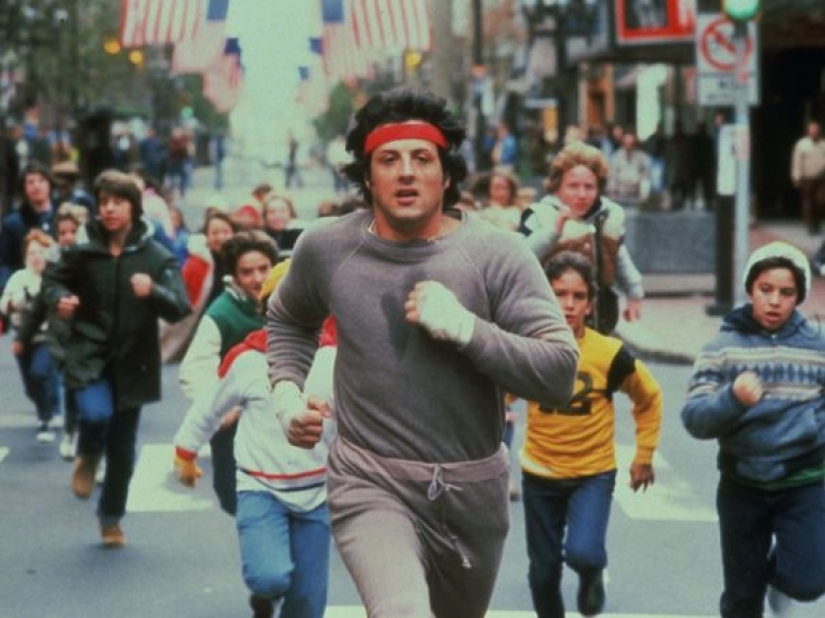
Sylvester Stallone, who in the mid-70s was himself half a step away from losing faith in dreams and perseverance, felt like no one else that such a history of the United States was simply necessary, and even in the jubilee year of the bicentennial of the signing of the Declaration of Independence.
The third-rate actor at that time, to whom the astrologer's mother predicted greater success in the screenwriting field, found suitable material in a real duel between the great Muhammad Ali and the retired boxer Chuck Wepner. The fight, which took place on March 24, 1975, lasted 15 rounds. This is despite the predictions that claimed that the absolute world champion would knock out an average professional in the first fight.The steadfastness of Wepner struck Stallone, who was hardened by a series of personal and career failures, and he made the boxer one of the prototypes of his Rocky, and the paraphrase of the memorable duel is the culmination of the script, the main part of which, in fact, is preparation for a key episode. The final fight of an unknown Italian stallion from Philadelphia with world champion Apollo Creed Sly compositionally rhymed with the opening scene of the film, in which Balboa defeats a weak opponent.
Of course, back in the 75th Stallone could only vaguely foresee that the success of the film according to his script would create many sequels. Sly's main task then was to convince the producers that no one could play Balboa better than him. By the way, Robert Chartoff and Irwin Winkler ("Driven horses are shot, aren't they?"), who took on the script of "Rocky", agreed that such a decision was logical and justified: the author who wrote the protagonist "from himself", and even the actor is the most obvious candidate for the main role.The catch was that the United Artists film company, which financed the projects of the production tandem, insisted on a star with a higher rank. For example, studio bigwigs would be satisfied with Robert Redford, Ryan O'Neal, James Caan or, at worst, "that guy from the Lords of Flatbush", but not Stallone. However, Sly was "rock-like" adamant and threatened the producers to bury his script in the garden, even despite the $350,000 compensation that the studio offered him for agreeing to give the role to another actor. Realizing that there would simply be no Rocky without Sylvester Stallone's participation, Chartoff and Winkler pointed out to United Artists a contract clause under which, with a project budget of less than a million dollars, the film company has no right to interfere in casting and other creative issues. Having thus reached an agreement with the studio, the producers began to look for a suitable director and invited John G., not the most obvious director, to this position. Evildsen, in whose filmography "Rocky" became the first life-affirming picture. Evildsen, a specialist in gloomy, acute social cinema, was surprised at first that he was being offered a sports drama, but after reading the script, he discovered in it his favorite motive of a little man and an unusual love line. Its originality lay in the fact that the hero was not fighting for the heart of a written beauty, but for the attention of the so-called "blue stocking", in which he saw a kindred soul. At the same time, Adrian had to open up under the influence of Rocky's feelings and turn into an attractive woman, which means that the role of Balboa's love interest had to be performed by an actress equally convincing both in the role of a gray mouse and in the image of a fashionable modern girl.Francis Ford Coppola's sister Talia Shire (Connie in The Godfather) perfectly met these requirements, especially since the idea of making a Balboa-friendly family Irish because of a modest budget had to be rejected and replaced by Italians. Therefore, Adrian's brother Paul Pennino was played by Bert Young. Another important role — the former coach of Rocky Mickey Goldmill — the creators, for the sake of the studio, who wanted to get at least one star name in the project, offered Burgess Meredith (The Penguin in the Batman TV series of the 60s). As the performer of another key character, Apollo Creed, the producers dreamed of seeing a real boxer, but for financial reasons they had to make do with the same newcomer as Stallone — Carl Weathers. In order to look worthy in the final match, the sparring partners performed a kind of acting feat.
The main character's dreams are also associated with the stairs leading to Philadelphia Museum of Art. After the release of the film, the 72 steps that Balboa manages to overcome after exhausting workouts became a symbol of man's victory over himself and were called Rocky Steps. A monument to Rocky in a triumphant pose was even erected near them. Shooting a picture in Philadelphia was fundamentally important not only because of the presence of a cinematic staircase. Stallone made his characters residents of the "city of brotherly love" because it was in it that the Declaration of Independence (1776) and The Constitution (1787) of the USA. In addition, the happiest young years of Sly himself passed in Philadelphia: it was for him (and therefore for Rocky) the very "land of hope". Nevertheless, producers on a modest budget were much more profitable to shoot the tape in Los Angeles, rather than paying the Philadelphia authorities for permission to shoot on the street. The situation was handled by John G. Evildsen, who convinced Chartoff and Winkler that he could accomplish the task in a short time and bypassing the unions. The director, who is used to working in low—budget movies, succeeded - most of the street scenes were shot in Philadelphia in 10 days.
The visual solution of the picture, shot mostly with a "documentary camera" following the typical routes of the hero, as well as with the help of a steadicam, is also connected with the tight deadlines. It is noteworthy that "Rocky" was one of the first films created using this system. The operator of the episodes in which steadicam is involved was his direct inventor Garrett Brown. In particular, he shot almost the most key scenes of the film — Balboa's runs and his duel with Apollo Creed. The incredible realism of the climactic episode is the merit not only of the cameraman, but also of the makeup artist. The plastic makeup that mimics hematomas and other boxing injuries was created by Michael Westmore. Curiously, the scene was shot in reverse order — from the end of the fight to its beginning, and the makeup disfiguring the opponents' faces gradually eased.
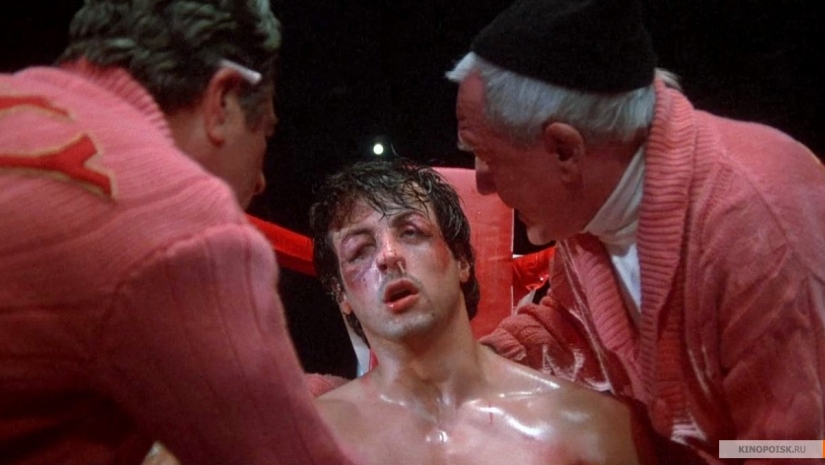
The visual solution of the duel is not only interesting from a technical point of view, but also has a number of features with symbolic meaning. So, the scene begins with a demonstration of the boxing arena from the extreme top point ("God's view"), and ends with a super-large plan of Rocky and Adrian embracing. Thus, the film emphasizes the idea that the true victory of the hero is the finding of a soul mate. In addition, archetypal ideas about Italians are symbolically played out in the picture. For example, their piety is emphasized by icons flashing in the frame every now and then (the opening scene of the battle) and crucifixes — including over the bed in Rocky's bachelor den. There is also an integral element of gangster films about the Italian mafia in the film — meat carcasses, which are introduced into the film narrative thanks to the profession of Paul Pennino and acquire a very ironic meaning when Balboa uses them as a punching bag. It is curious that we observe one of such "meat training" during a television report about an Italian stallion — one of the many examples of using a TV frame in space. He has several functions in the film. Firstly, it is an essential element of American culture and everyday life. Secondly, the TV helps to beat the idea that a citizen who was an ordinary soldier yesterday can become a screen star today. And finally, he points to the time of the action — for example, when Rocky and Adrian are watching a Christmas movie, we understand that it is Christmas Eve 1975 in the yard of the heroes, which means that the duel scheduled for January 1, 76 is not far off.
The motivating effect of "Rocky", which has conquered more than one generation of moviegoers, is partly due to the main musical theme of the film, the composition Gonna Fly Now, written by Bill Conti. The rest of the instrumental soundtrack is also his handiwork.
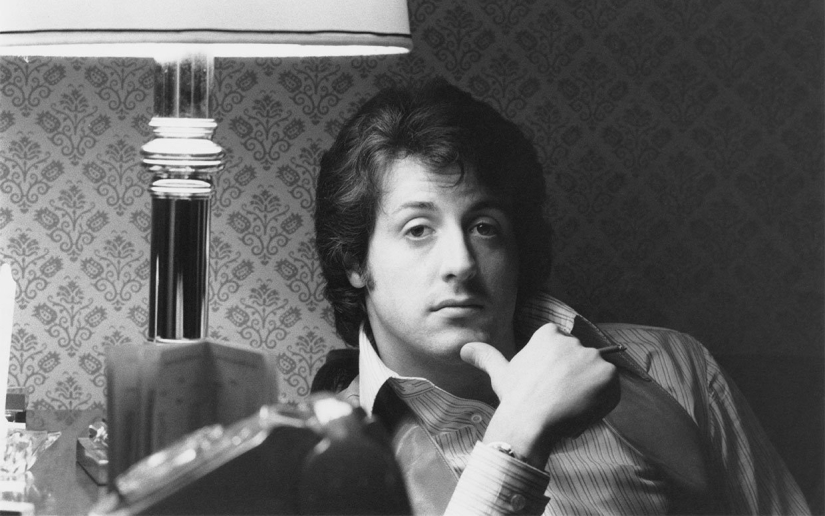
The third-rate actor at that time, to whom the astrologer's mother predicted greater success in the screenwriting field, found suitable material in a real fight between the great Muhammad Ali and the retired boxer Chuck Wepner. The fight, which took place on March 24, 1975, lasted 15 rounds. This is despite the predictions that claimed that the absolute world champion would knock out an average professional in the first fight.The steadfastness of Wepner struck Stallone, who was hardened by a series of personal and career failures, and he made the boxer one of the prototypes of his Rocky, and the paraphrase of the memorable duel is the culmination of the script, the main part of which, in fact, is preparation for a key episode. The final fight of an unknown Italian stallion from Philadelphia with world champion Apollo Creed Sly compositionally rhymed with the opening scene of the film, in which Balboa defeats a weak opponent.
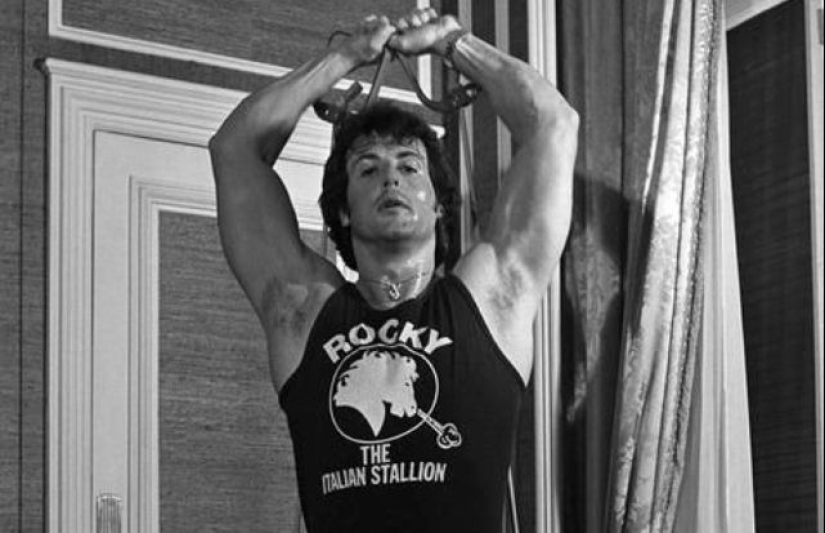
Additional shades of the story are given by the love line, which again metaphorically echoes the climax. In his quest to woo the shy pet store saleswoman, Rocky demonstrates the same unwavering perseverance as in the battle with Creed. The hero intuitively understands that the relationship with Adrian should be a turning point in his wayward life, and does not intend to give up before difficulties.
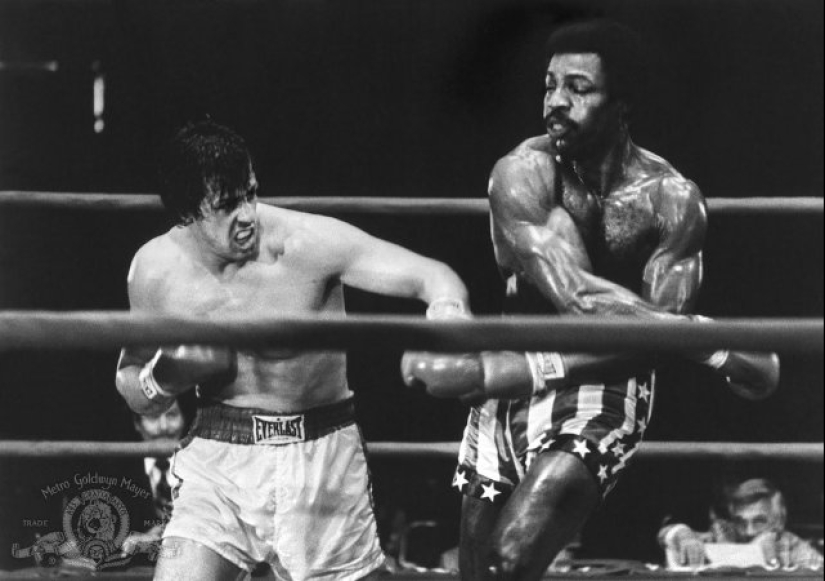
Of course, such perseverance is rewarded — the love of an unapproachable girl helps him to believe in himself, inspires him to exhausting training before a fateful fight, gives him the strength to hold on in an unequal duel to the last and, in general, becomes Rocky's main victory in the final, because the formal winner of the battle is still Creed. The latter circumstance, in turn, adds originality to the standard story of the outsider's triumph, making the tale of "Cinderella in boxer shorts" more realistic. In addition, the unconventional ending hints at the possibility of a sequel in which the Italian stallion's American dream is fully realized.
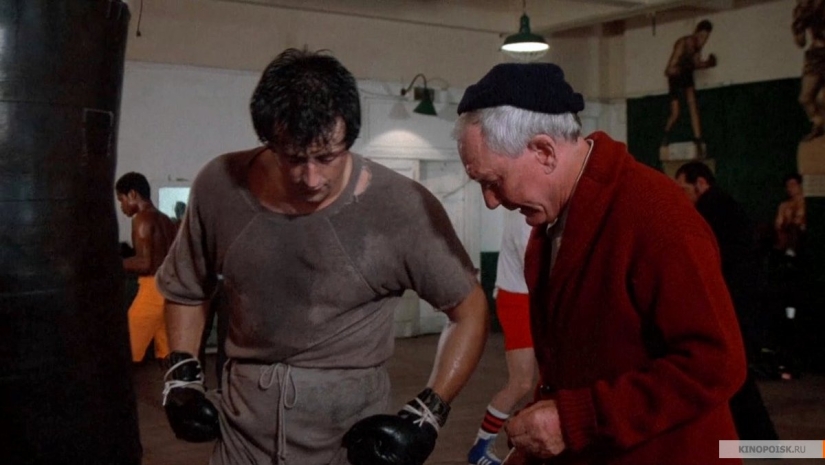
Of course, back in the 75th Stallone could only vaguely foresee that the success of the film according to his script would create many sequels. Sly's main task then was to convince the producers that no one could play Balboa better than him. By the way, Robert Chartoff and Irwin Winkler ("Driven horses are shot, aren't they?"), who took on the script of "Rocky", agreed that such a decision was logical and justified: the author who wrote the protagonist "from himself", and even the actor is the most obvious candidate for the main role.The catch was that the United Artists film company, which financed the projects of the production tandem, insisted on a star with a higher rank. For example, studio bigwigs would be satisfied with Robert Redford, Ryan O'Neal, James Caan or, at worst, "that guy from the Lords of Flatbush", but not Stallone. However, Sly was "rock-like" adamant and threatened the producers to bury his script in the garden, even despite the $350,000 compensation that the studio offered him for agreeing to give the role to another actor.
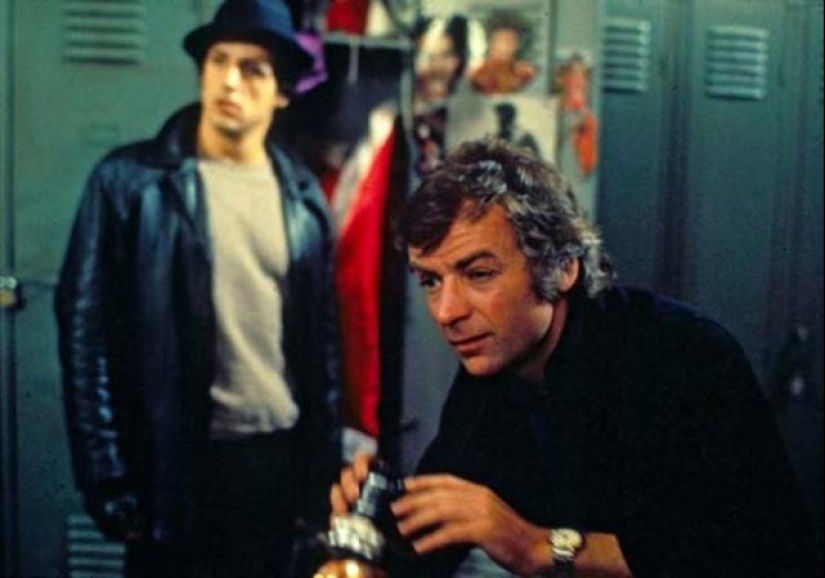
Realizing that there would simply be no Rocky without Sylvester Stallone's participation, Chartoff and Winkler pointed out to United Artists a contract clause under which, with a project budget of less than a million dollars, the film company has no right to interfere in casting and other creative issues. Having thus reached an agreement with the studio, the producers began to look for a suitable director and invited John G., not the most obvious director, to this position. Evildsen, in whose filmography "Rocky" became the first life-affirming picture.
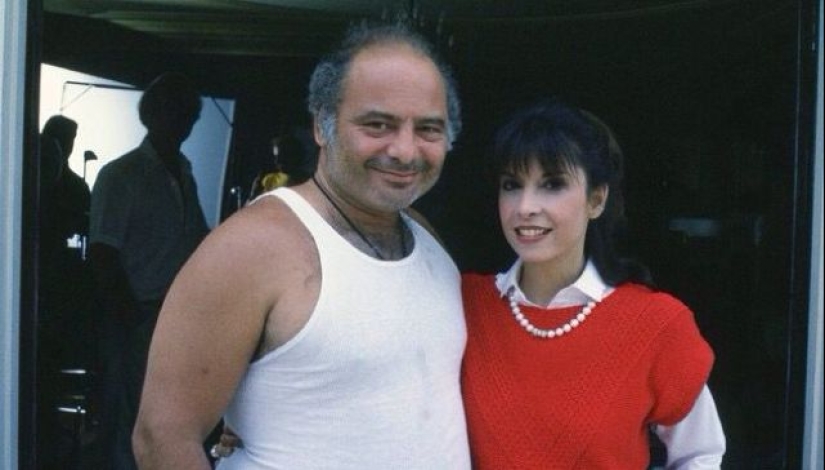
Evildsen, a specialist in gloomy, acute social cinema, was surprised at first that he was being offered a sports drama, but after reading the script, he discovered in it his favorite motive of a little man and an unusual love line. Its originality lay in the fact that the hero was not fighting for the heart of a written beauty, but for the attention of the so-called "blue stocking", in which he saw a kindred soul. At the same time, Adrian had to open up under the influence of Rocky's feelings and turn into an attractive woman, which means that the role of Balboa's love interest was to be performed by an actress equally convincing both in the role of a gray mouse and in the image of a fashionable modern girl.Francis Ford Coppola's sister Talia Shire (Connie in The Godfather) perfectly met these requirements, especially since the idea of making a Balboa-friendly family Irish because of a modest budget had to be rejected and replaced by Italians. Therefore, Adrian's brother Paul Pennino was played by Bert Young.
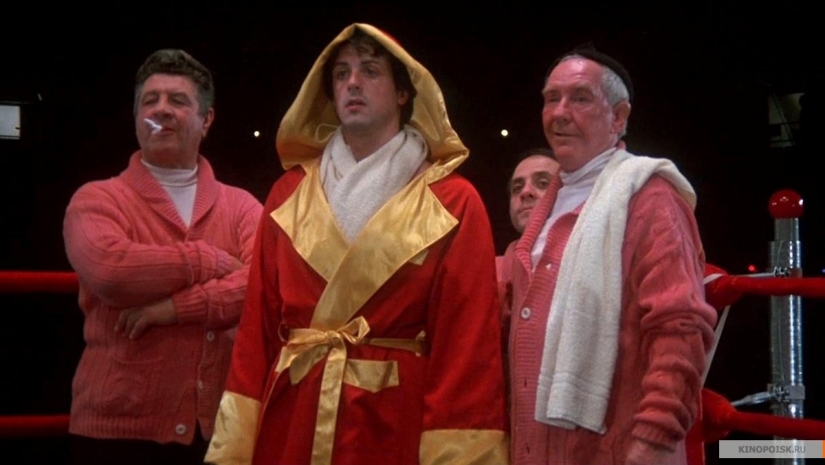
Another important role — the former coach of Rocky Mickey Goldmill — the creators, for the sake of the studio, who wanted to get at least one star name in the project, offered Burgess Meredith (The Penguin in the Batman TV series of the 60s). As the performer of another key character, Apollo Creed, the producers dreamed of seeing a real boxer, but for financial reasons they had to make do with the same newcomer as Stallone — Carl Weathers. In order to look worthy in the final match, the sparring partners performed a kind of acting feat.
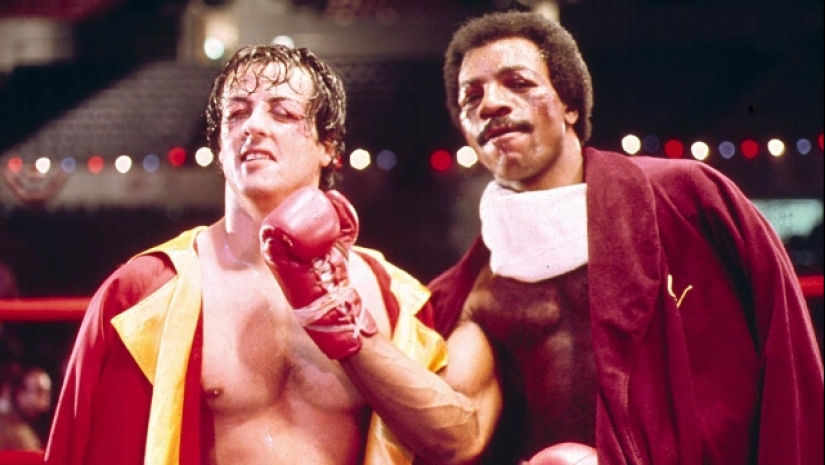
For several months they did not get out of the gym to learn the basic techniques of boxing and get their bodies in proper physical shape. As a result, Stallone mastered boxing skills so that he was able to independently paint the script of the choreography of the climactic fight, making it feasible for him and Weathers and at the same time convincing. Later, Sly recalled with a smile that it was 30 pages of text, almost entirely consisting of the words "left hook" and "right hook". In addition , during rehearsals , Stallone and Weathers often made mistakes with hooks and inflicted more than one real physical injury on each other, suffering no less than other pros.
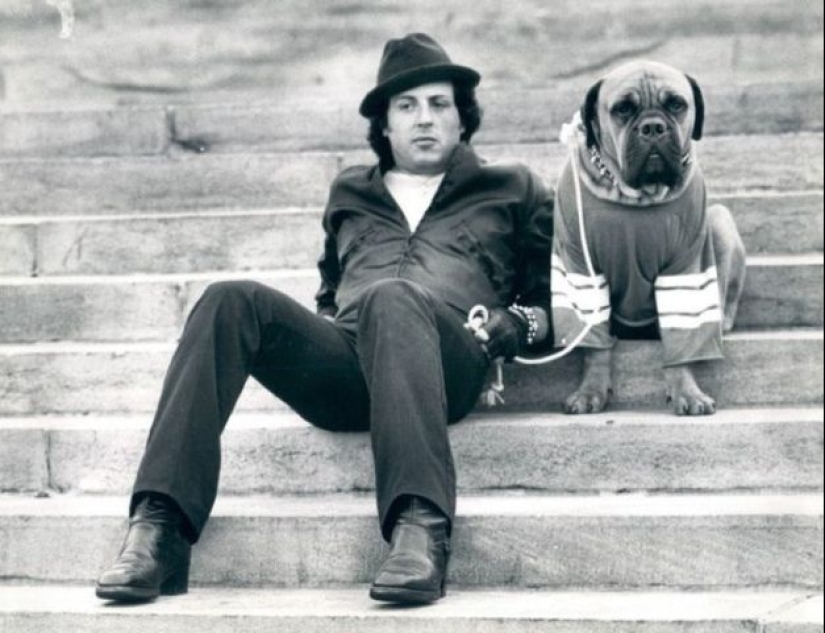
However, one professional boxer still agreed to take part in the film. It was Joe Frazier, the only heavyweight champion of the world, who promised to come to the shooting of the Balboa fight and Creed. It is symbolic that Fraser, like Rocky, was a native of Philadelphia, so his cameo is especially valuable. In addition, in the episodes you can see the cult trash cinematographer Lloyd Kaufman (drunk at the Lucky Seven tavern), the brother of Sly pop singer Frank Stallone (a member of the band singing on the corner street), their father Frank Sr. (the timekeeper judge) and the handsome bullmastiff Batkis, who played the "dream dog"Rocky Balboa.
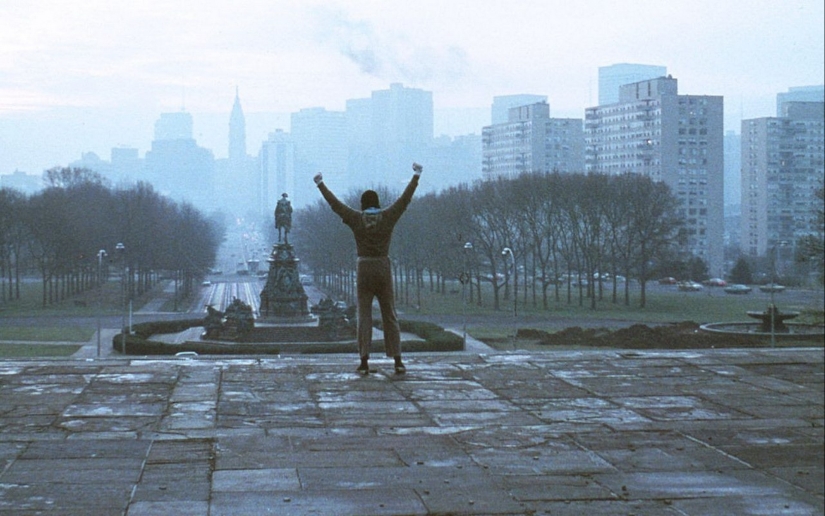
The main character's dreams are also associated with the stairs leading to Philadelphia Museum of Art. After the release of the film, the 72 steps that Balboa manages to overcome after exhausting workouts became a symbol of man's victory over himself and were called Rocky Steps. A monument to Rocky in a triumphant pose was even erected near them.
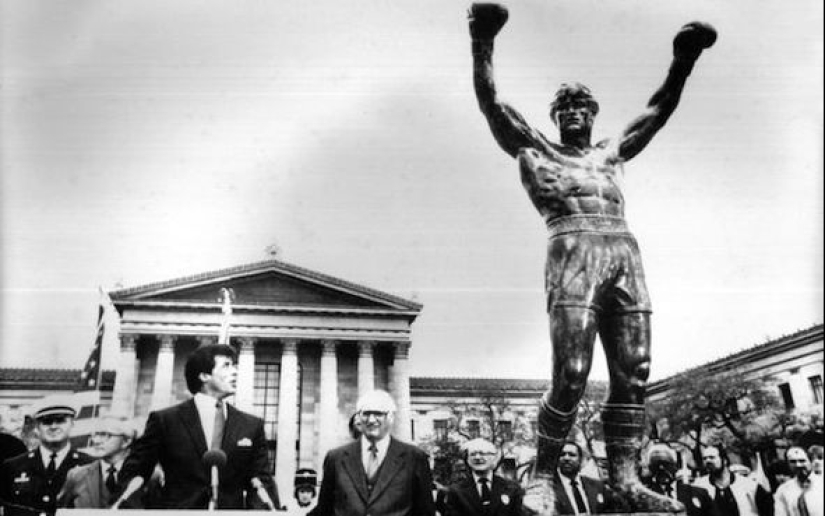
Shooting a picture in Philadelphia was fundamentally important not only because of the presence of a cinematic staircase. Stallone made his characters residents of the "city of brotherly love" because it was in it that the Declaration of Independence (1776) and The Constitution (1787) of the USA. In addition, the happiest young years of Sly himself passed in Philadelphia: it was for him (and therefore for Rocky) the very "land of hope". Nevertheless, producers on a modest budget were much more profitable to shoot the tape in Los Angeles, rather than paying the Philadelphia authorities for permission to shoot on the street. The situation was handled by John G. Evildsen, who convinced Chartoff and Winkler that he could accomplish the task in a short time and bypassing the unions. The director, who is used to working in low—budget movies, succeeded - most of the street scenes were shot in Philadelphia in 10 days.
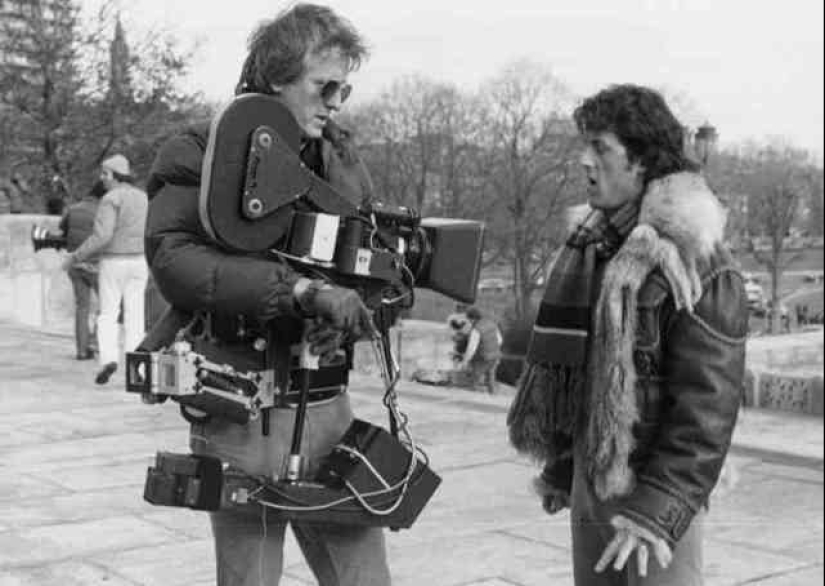
The visual solution of the picture, shot mostly with a "documentary camera" following the typical routes of the hero, as well as with the help of a steadicam, is also connected with the tight deadlines. It is noteworthy that "Rocky" was one of the first films created using this system. The operator of the episodes in which steadicam is involved was his direct inventor Garrett Brown. In particular, he shot almost the most key scenes of the film — Balboa's runs and his duel with Apollo Creed.
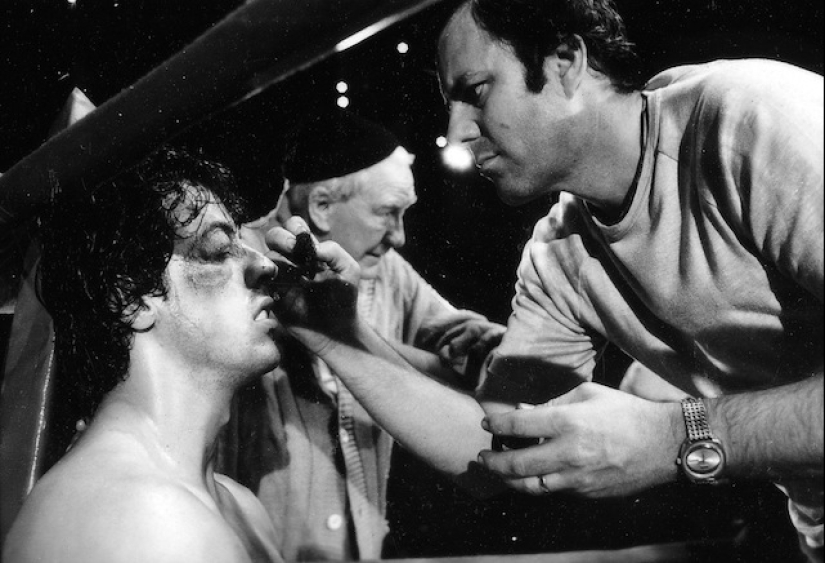
The incredible realism of the climactic episode is the merit not only of the cameraman, but also of the makeup artist. The plastic makeup that mimics hematomas and other boxing injuries was created by Michael Westmore. Curiously, the scene was shot in reverse order — from the end of the fight to its beginning, and the makeup that disfigured the opponents' faces gradually eased.
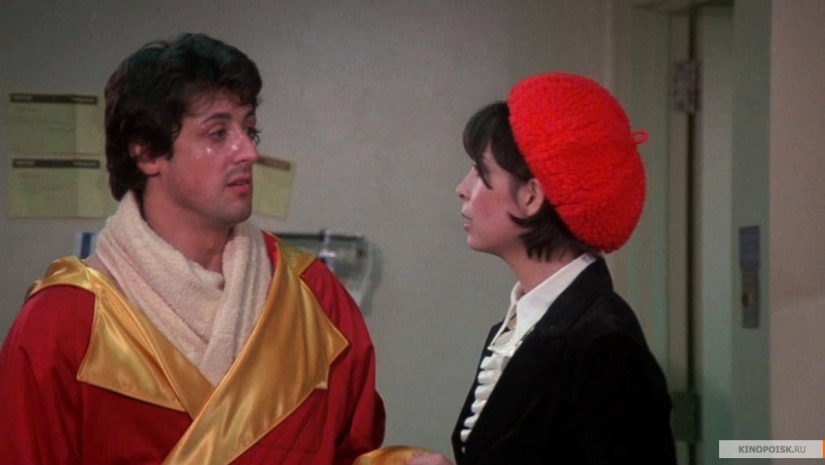
The visual solution of the duel is not only interesting from a technical point of view, but also has a number of features with symbolic meaning. So, the scene begins with a demonstration of the boxing arena from the extreme top point ("God's view"), and ends with a super-large plan of Rocky and Adrian embracing. Thus, the film emphasizes the idea that the true victory of the hero is the finding of a soul mate.
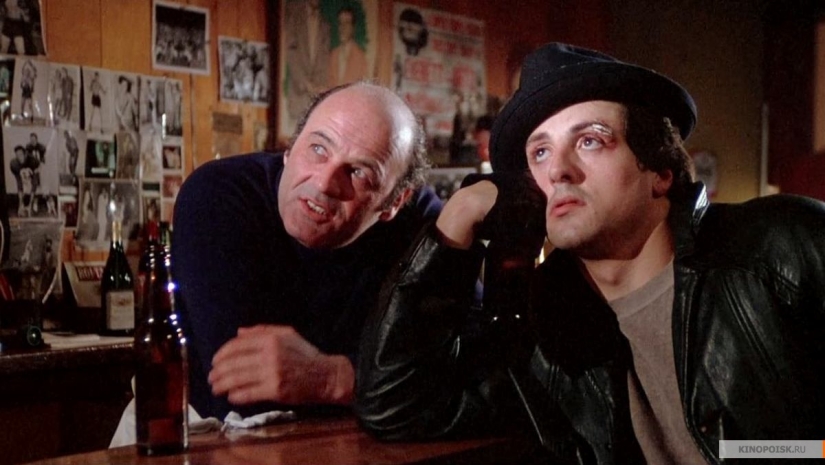
In addition, archetypal ideas about Italians are symbolically played out in the picture. For example, their piety is emphasized by icons flashing in the frame every now and then (the opening scene of the battle) and crucifixes — including over the bed in Rocky's bachelor den. There is also an integral element of gangster films about the Italian mafia in the film — meat carcasses, which are introduced into the film narrative thanks to the profession of Paul Pennino and acquire a very ironic meaning when Balboa uses them as a punching bag.
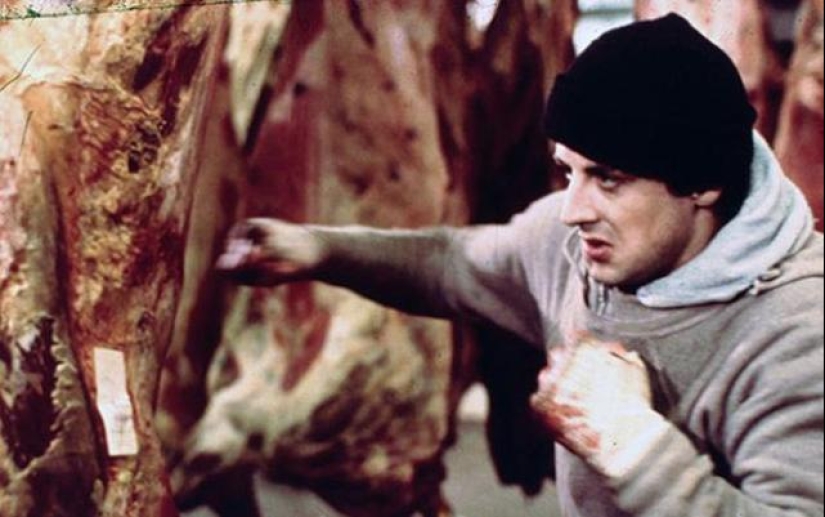
It is curious that we observe one of such "meat training" during a television report about an Italian stallion — one of the many examples of using a TV frame in space. He has several functions in the film. Firstly, it is an essential element of American culture and everyday life. Secondly, the TV helps to beat the idea that a citizen who was an ordinary soldier yesterday can become a screen star today. And finally, he points to the time of the action — for example, when Rocky and Adrian watch a Christmas movie, we understand that it is Christmas Eve 1975 in the yard of the heroes, which means that the duel scheduled for January 1, 76 is not far off.
Recent articles

It's high time to admit that this whole hipster idea has gone too far. The concept has become so popular that even restaurants have ...

There is a perception that people only use 10% of their brain potential. But the heroes of our review, apparently, found a way to ...

New Year's is a time to surprise and delight loved ones not only with gifts but also with a unique presentation of the holiday ...